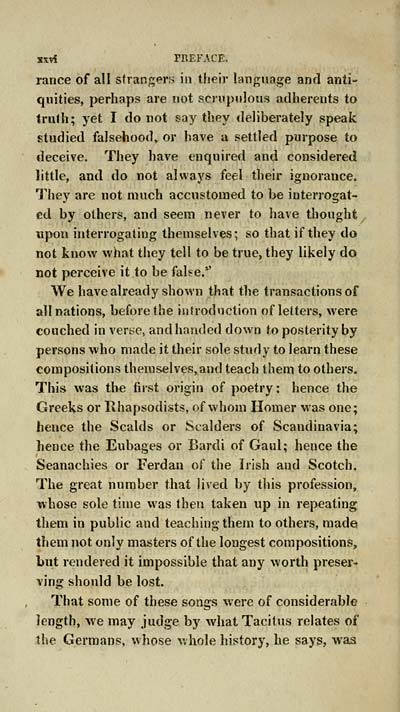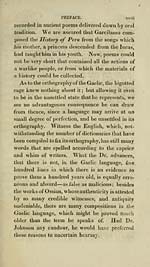J. F. Campbell Collection > Original collection of the poems of Ossian, Orrann, Ulin, and other bards, who flourished in the same age
(36)
Download files
Complete book:
Individual page:
Thumbnail gallery: Grid view | List view

xxTi PREFACE.
ranee of all strangers in their language and anti-
quities, perhaps are not scrupulous adherents to
truth; yet I do not say they deliberately speak
studied falsehood^ or have a settled purpose to
deceive. They have enquired and considered
little, and do not always feel their ignorance.
They are not much accustomed to be interrogat-
ed by others, and seem never to have thought
upon interrogating themselves; so that if they do
not know what they tell to be true, they likely do
not perceive it to be fake/'
We have already shown that the transactions of
all nations, before the introduction of letters, were
couched in verse, and handed down to posterity by
persons who made it their sole study to learn these
compositions themselves, and teach them to others.
This was the first origin of poetry : hence the
Greeks or Rhapsodists, of whom Homer was one;
hence the Scalds or Scalders of Scandinavia;
hence the Eubages or Bardi of Gaul; hence the
Seanachies or Ferdan of the Irish and Scotch,
The great number that lived by this profession,
whose sole time was then taken up in repeating
them in public and teaching them to others, made
them not only masters of the longest compositions,
but rendered it impossible that any worth preser-
ving should be lost.
That some of these songs were of considerable
length, we may judge by what Tacitus relates of
the Germans, whose whole history, he says, was
ranee of all strangers in their language and anti-
quities, perhaps are not scrupulous adherents to
truth; yet I do not say they deliberately speak
studied falsehood^ or have a settled purpose to
deceive. They have enquired and considered
little, and do not always feel their ignorance.
They are not much accustomed to be interrogat-
ed by others, and seem never to have thought
upon interrogating themselves; so that if they do
not know what they tell to be true, they likely do
not perceive it to be fake/'
We have already shown that the transactions of
all nations, before the introduction of letters, were
couched in verse, and handed down to posterity by
persons who made it their sole study to learn these
compositions themselves, and teach them to others.
This was the first origin of poetry : hence the
Greeks or Rhapsodists, of whom Homer was one;
hence the Scalds or Scalders of Scandinavia;
hence the Eubages or Bardi of Gaul; hence the
Seanachies or Ferdan of the Irish and Scotch,
The great number that lived by this profession,
whose sole time was then taken up in repeating
them in public and teaching them to others, made
them not only masters of the longest compositions,
but rendered it impossible that any worth preser-
ving should be lost.
That some of these songs were of considerable
length, we may judge by what Tacitus relates of
the Germans, whose whole history, he says, was
Set display mode to: Large image | Transcription
Images and transcriptions on this page, including medium image downloads, may be used under the Creative Commons Attribution 4.0 International Licence unless otherwise stated. ![]()
| Early Gaelic Book Collections > J. F. Campbell Collection > Original collection of the poems of Ossian, Orrann, Ulin, and other bards, who flourished in the same age > (36) |
|---|
| Permanent URL | https://digital.nls.uk/81002067 |
|---|
| Description | Volumes from a collection of 610 books rich in Highland folklore, Ossianic literature and other Celtic subjects. Many of the books annotated by John Francis Campbell of Islay, who assembled the collection. |
|---|
| Description | Selected items from five 'Special and Named Printed Collections'. Includes books in Gaelic and other Celtic languages, works about the Gaels, their languages, literature, culture and history. |
|---|

